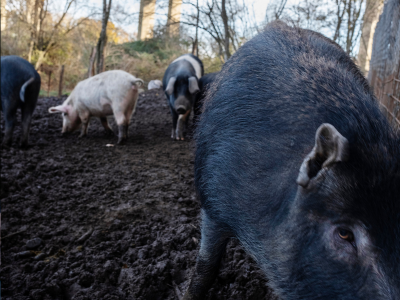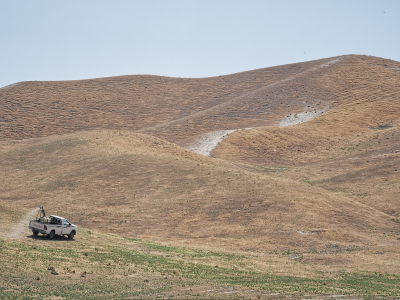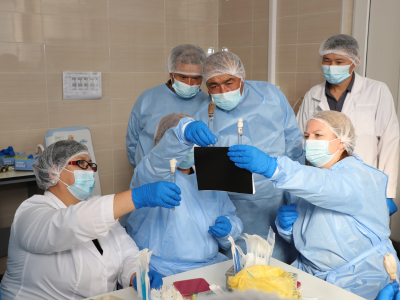Elements: phytosanitary, food safety standards, best practices and system architecture, sanitary/veterinary control issues
Global agricultural markets have become increasingly complex in the past two decades, mainly because of increasing controls and standards designed to ensure food safety and prevent the spread of plant and animal diseases.
In food safety, weaknesses in national controls and in the implementation of global food regulations have led to an emergence of standards and requirements being set by the private sector, with the involvement of certification bodies and regional organizations in implementation and enforcement. FAO helps countries develop country-specific food control systems, regulations and standards that are in harmony with global food standards.
FAO addresses animal health by supporting veterinary services in the prevention and control of transboundary animal diseases, the improvement of diagnostic and laboratory capacities, and the promotion of the prudent use of antimicrobials. Antimicrobial resistance and zoonotic diseases are important cross-cutting issues. Plant health issues are covered through the development of capacities of plant protection organizations at regional and national levels. This Regional Priority Programme also helps regional bodies develop capacities in biosafety. Through this Priority Programme, regional biosafety networks will be strengthened for compliance with WTO agreements.

Quadripartite meeting in Vienna advances One Health in Europe and Central Asia
17/06/2024

International network plans action against invasive species in urban forests
14/06/2024
FAO and the Regional Centre for Forestry and Rural Development (REFORD) in North Macedonia hosted the annual international meeting of the Forest Invasive Species Network for Europe and Central Asia (REUFIS) from 4 to 6 June 2024 in Skopje, North Macedonia. The primary focus of this year’s meeting was the role of invasive species in urban forest planning. During this three-day event, participants explored the relationship between invasive species and urban forestry.

FAO helps develop action plan to control fish diseases in Kyrgyzstan
10/06/2024
Disease outbreaks severely constrain aquaculture development, and the processes for controlling diseases and managing health are different in aquaculture than in the terrestrial livestock sector, primarily due to the fluid environment. For this reason, Kyrgyzstan, with support from the Food and Agriculture Organization of the United Nations (FAO), has begun to develop a national action plan for the control of fish diseases. The project supports fish farms through the implementation of best practices in fish health management, biosafety on fish farms and the planning of production activities. This can help improve product quality and increase production volumes.

Locust control can be made more sustainable, Central Asia’s agriculture ministers say
07/06/2024

To safeguard the food supply from hazards, proactivity is key, say food industry experts in Kyrgyzstan
07/06/2024

In the Western Balkans, FAO builds capacity in investigating outbreaks of African swine fever
24/05/2024

FAO and Tajikistan: a new round of locust mitigation activities
08/04/2024

FAO boosts animal health training with accredited online courses
27/03/2024

New programme addresses zoonotic diseases and strengthens animal health services in Kyrgyzstan
15/03/2024

2023 in review: the FAO Virtual Learning Centre—more students, more impact and more to come in 2024
27/12/2023

Antimicrobial use and resistance in the livestock sector take centre stage in Budapest
12/12/2023
Globally, we are faced with an urgent and unprecedented need to significantly reduce the growing global threat of antimicrobial resistance (AMR) in the livestock sector caused by overuse and misuse of antimicrobials.
To accelerate work to combat AMR in the Western Balkans, the Food and Agriculture Organization of the United Nations (FAO) convened a technical consultation meeting on antimicrobial use and resistance in the Western Balkans, from 6 to 7 December, in a hybrid format.

Dairy farmers in Montenegro take ownership of local development
24/11/2023

Finetuning prevention and early detection of African swine fever
09/10/2023

Countries in Europe and Central Asia reconfirm commitment to advance food standards in the region
25/09/2023

Veterinarians take virtual training to fight transboundary animal diseases
20/06/2023

Central Asian Animal Health Network members look at the future of animal health and One Health
09/06/2023

World Food Safety Day events in Kyrgyzstan promote food standards
07/06/2023

Modernizing food safety while preserving traditions in Serbia
10/01/2023
.tmb-th600x400.jpg?Culture=en&sfvrsn=f532d7c2_2)
Online training helps veterinarians combat avian influenza
15/12/2022
.tmb-th600x400.jpg?Culture=en&sfvrsn=460e7816_2)
A regional network of laboratories will help fight antimicrobial resistance
08/12/2022
Components
- Implementation of trade agreements to increase access to new markets
- Increased capacity to implement global standards
- Supportive policy environment for domestic agrifood markets and export promotion


